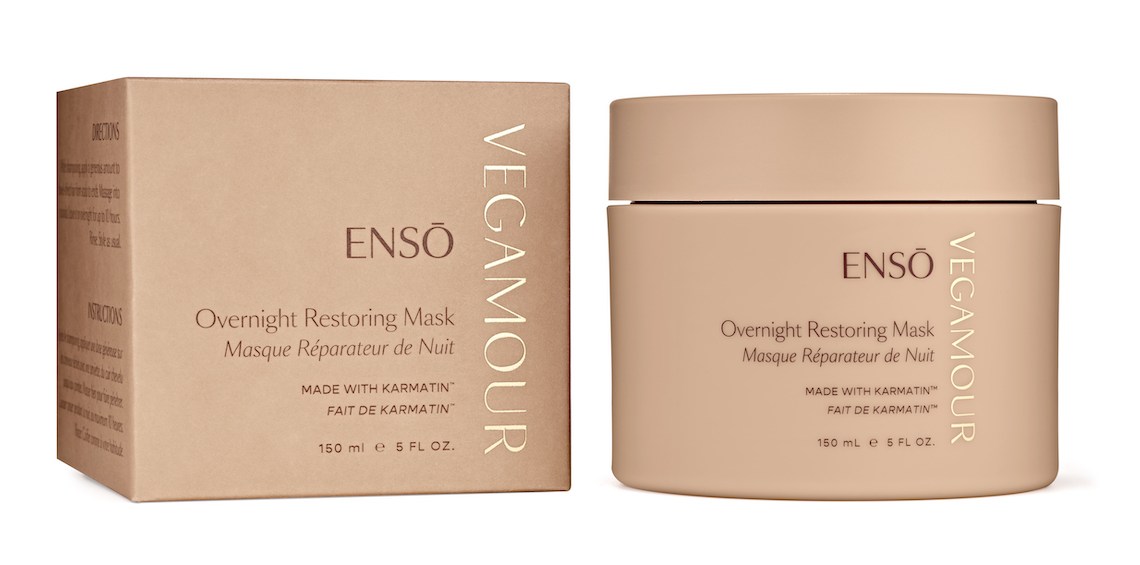On Thursday, Vegamour hair care launched outside of its core hair loss and hair growth treatments as it seeks to build upon a “hair wellness” category.
The launch introduces a new line called Ensō, with the first product being an Overnight Restoring Mask sold on the brand’s DTC e-commerce. The hair mask is a nourishing and hydrating product meant to add moisture and repair damage while protecting hair from future heat, UV and environmental damage.
Daniel Hodgdon, CEO of Vegamour, described Ensō as the next step in building Vegamour’s hair wellness concept, where hair and the hair cycle are thought of as an ecosystem due to their three phases of growth, rest and shed. Vegamour’s portfolio already covers hair growth, hair loss and dandruff through shampoos, conditioners, serums and ingestible supplements. The mask sells exclusively via Vegamour.com, though Vegamour expanded to its first retail partner, Sephora.com, in June.
“Hair is like the canary in the coal mine; it’s a great indicator that something’s not right in your body or something’s changing,” Hodgdon said. “[We’re trying to] redefine what hair care should be. The way it has been defined for the last 40 years is ‘how to make it look better,’ rather than [addressing] why it’s brittle or gets thinner.”
Vegamour launched in 2016, and Hodgdon said the brand earned $5 million in 2019 sales, with 38% of sales coming through subscription. This fell short of expectations, according to Glossy reporting in Nov. 2018, when Vegamour expected to earn $10 million in revenue for 2019 with the goal of having 65% of sales through subscription. Vegamour received $80 million in minority stake funding from private equity juggernaut General Atlantic in April. Hodgdon said Vegamour would earn $90 million in 2021, with 51% of its sales coming through subscriptions. Subscribers receive 13-25% off the price of products that are delivered once a month.
Last year saw a tremendous explosion of conversation around hair loss, with anecdotal reports of people losing their hair during the U.S. quarantine period of Covid-19 due to stress or other factors. Hodgdon said that he does not feel that this period spurred additional hair loss, but rather that it brought the conversation to the forefront of public discourse. The American Hair Loss Association reports that 40% of all hair loss sufferers are women. Hodgdon said that 45% of Vegamour’s customers are women ages 18-34
There’s long been a scarcity of well-known brands catering to women experiencing hair loss, aside from perhaps Women’s Rogaine. But Head & Shoulders and Virtue launched their own hair loss and growth products in 2021, while new dedicated brands like MDhair debuted and existing brands like Nutrafol experienced sales boosts. Given that Vegamour has dedicated itself to hair loss and growth for five years, it is now getting out ahead of those catching up by venturing into yet another new territory for the hair care sector.
Ad position: web_incontent_pos1
“We’re calling [this category] ‘prejuvenation,'” said Erica Wohlwend, CMO of Vegamour. “Prejuvenation is a preventative care regimen designed to delay the appearance of aging symptoms by addressing the underlying root causes of poor hair health.”
Wohlwend said she feels “prejuvenation” is a concept that will require education. As such, the brand will roll out social media marketing and advertising around it at the beginning of 2022. Hodgdon added that a lot of the conversation will consist of educating customers about what ingredients are in their existing hair care products, such as animal-derived keratin, and why they don’t address long-term needs or solutions to hair problems. Wohlwend declined to share specifics, but Vegamour prominently advertises via YouTube, Facebook, Instagram and social media influencers.
A more extensive collection of products within Ensō that address fine, medium and thick hair will debut in the second quarter of 2022. Vegamour will tap influencers in each hair category for social promotion.
On its DTC e-commerce site, Vegamour also launched a three-minute hair questionnaire on Thursday. It was developed to offer shoppers suggestions on hair-care routines based on their hair type and pattern, concerns, current routine and lifestyle.
“We don’t wait until we start seeing crow’s feet before we start moisturizing your face. That’s what we’re advocating for with Ensō,” said Hodgdon. “[The term] ‘hair care’ is a misnomer. It’s disingenuous. What is called hair care today is not hair care — it’s the opposite. It’s a quick fix or a Band-Aid that doesn’t look at the underlying issues.”




